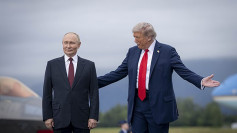Donald Trump Jr., the eldest son of the former president, has ignited a storm of criticism following a contentious Instagram post that appeared to mock Michelle Obama by comparing her to former NFL player Levon Kirkland, Business Times has learned. The post, which Trump Jr. shared amid the Super Bowl festivities, featured an image of the ex-Pittsburgh Steelers linebacker captioned as a "rare Michelle Obama rookie card," accompanied by a note of "Super Bowl nostalgia."
The post quickly drew sharp rebukes from various quarters, with accusations of racism and misogyny dominating the discourse. Independent journalist Aaron Rupar took to X, formerly known as Twitter, to decry what he termed "insane levels of racist misogyny" evident in Trump Jr.'s social media activity. Other users echoed this sentiment, labeling the post as "disgusting mean behavior" and "so low," reflecting a broader consensus among critics who viewed the comparison as deeply offensive.
insane levels of racist misogyny on Don Jr’s Instagram page pic.twitter.com/rXOLZURDxZ — Aaron Rupar (@atrupar) February 12, 2024
What a pathetic loser Don Jr truly is. Racist and misogynistic beyond belief. I hope he is as miserable as he is racist. https://t.co/j4VxSjEOmI — Martina Navratilova (@Martina) February 12, 2024
In a seemingly preemptive move to deflect potential backlash, Trump Jr. added a disclaimer to his post, suggesting it was intended as a joke and appealing to fact-checkers to treat it as such, albeit with a note of ambiguity about his own conviction in the claim. This did little to quell the outrage, as social media users dredged up a baseless and offensive conspiracy theory that has circulated in fringe circles, suggesting the former first lady is transgender-a notion that has been roundly debunked but continues to surface among certain conspiracy theorists.
This is not the first time Trump Jr. has courted controversy with his comments about Michelle Obama. His "Triggered" podcast has previously served as a platform for airing unfounded theories about her, drawing parallels with the likes of conspiracy theorist Alex Jones, who has also propagated the discredited narrative about Obama's gender.
The backlash to Trump Jr.'s post underscores the volatile intersection of politics, social media, and public discourse, where inflammatory comments can quickly escalate into widespread condemnation. Critics argue that such posts not only perpetuate harmful stereotypes but also degrade the quality of political dialogue, echoing concerns about the broader implications of using public platforms to disseminate derogatory content.
As the controversy unfolds, calls for accountability and a reevaluation of the discourse on social media platforms grow louder, with many urging a return to a more respectful and fact-based engagement, especially concerning public figures. The incident serves as a stark reminder of the enduring power of social media to shape narratives and the pressing need for vigilance against the spread of misinformation and offensive content.






